- Home
- Fredric Brown
The Screaming Mimi Page 15
The Screaming Mimi Read online
Page 15
He left the file and tried the cabinet. Stationery supplies on the shelf, an old raincoat hanging on one of the hooks, and a portable typewriter case standing on the bottom.
He looked in the raincoat’s pockets and found nothing but a dirty handkerchief and a pair of month-old theater stubs. He opened the portable typewriter case to make sure that it contained the typewriter, and it did.
It looked pretty much like the one he himself had owned up to the point on his recent bender when he’d taken it out to sell. It was the same make and model but when he looked at it closely he saw it wasn’t the same typewriter, which would have been a fascinating discovery.
The drawer of the table contained nothing more fascinating than an old hectograph, two of the three chairs were empty and the third chair contained only Jay Ehlers, who was staring at him with a saturnine expression.
Jay asked, “Well, find anything?”
Sweeney grunted an answerless answer and turned to the desk. On top of it was a blotter pad, a pen set and a telephone. He looked under the blotter pad; there was nothing there. He tried the drawers. Only the left-hand top one was locked. He said, “Hey, pal. Your department.” That was the drawer that interested him. He went through the others hastily while Jay opened the locked one.
There wasn’t anything in any of the other drawers of particular interest to Sweeney, except, possibly, one full bottle of whiskey. And right now he wasn’t interested in that.
Jay opened the drawer and glanced at his watch. He said, “Snap it up, Bill. You said fifteen minutes and we’ve been here twenty-three already.”
Inside the locked drawer was a ledger and a thick brown envelope marked: “Current Contracts”.
Sweeney looked at the ledger first, but it turned out to be a journal rather than a ledger, not indexed, and listing receipts and expenditures in chronological order. He thumbed through it rapidly but saw that he wasn’t going to get anything from it – aside from the fact, which he didn’t doubt anyway, that Greene had a legitimate business as a booking agent. Probably the figures wouldn’t be too straight anyway, but were kept for income tax purposes.
He took up and opened the envelope marked “Current Contracts”.
There were a dozen of them there, but only one interested Sweeney; that was the contract between El Madhouse, Nick Helmos signing, and Yolanda Lang. The contract called for two hundred dollars a week for the joint services of Yolanda Lang and Devil. But neither Yolanda nor the dog had signed it; the signature was Richard M. Greene.
Sweeney upped an eyebrow. He asked, “Can’t she write?”
“Can’t who write?”
Sweeney said, “I can understand why the dog didn’t sign it.”
“Look, I thought you were looking for a razor or a shiv.”
Sweeney sighed. What he’d really been looking for most was a small black statuette. But if Doc had that, it was at his flat or hotel or wherever he lived, not at his office. And – even if he could find out, at this late hour, where Doc lived – he couldn’t crowd his luck by burglarizing it tonight.
And, anyway, why couldn’t he get Doc Greene off his mind so he could concentrate on other angles? A trip to Brampton, Wisconsin, for instance, to talk to the sculptor – what was his name? Chapman Wilson – who had made Mimi.
There was a chance, an off chance, that might lead somewhere. He didn’t see where or how. And maybe, getting back to Greene, damn him, a trip to New York to see whether Greene’s alibi – his only solid one – was really one hundred per cent solid. The police there might or might not have dug under the surface fact that he was registered at a hotel.
Sweeney doubted that they had.
Or, if he had a lot of money, he might save himself that trip by having a New York private detective do the job for him. But that would have to be on Sweeney; the Blade would never cover it.
Damn money! He still had a hundred dollars or so out of the checks Wally Krieg had given him, but at the rate it was vanishing, he’d barely get by for the ten days before another check would be coming from the Blade. Let alone spending any money on the Ripper or on Yolanda.
He heard Jay Ehlers move restlessly, and looked back at the contract in his hand. He said, “Just a minute, Jay.” He read the contract through and frowned. He read one paragraph again to make sure it really said what he thought it said, and it did. He put the contract back in the envelope with the others, put the envelope in the drawer, and told Jay to relock it.
Jay said, “Well, find what you were looking for?”
“No. Yes. I don’t know what I was looking for, but I found something.”
“What?”
“I’m damned if I know,” Sweeney said. But he thought he did; he’d found some money if he was willing to take a chance.
Jay grunted as the lock clicked. He said, “Come on, then. Let’s clear out of here. We’ll argue about it over a drink.”
Sweeney turned out the lights and waited in the hallway while Jay relocked the door of Room 411.
They walked very quietly down to the second floor and there Sweeney put his finger to his lips and then pressed the button of the elevator signal. As soon as they heard the door clang shut a floor below them, they started down the stairs and were on the first floor by the time the operator opened the door on the second. They were out of the building and two doors away by the time the elevator got back down to the first floor.
Ehlers said, “He’ll know somebody pulled a fast one to get out of the building without being seen.” Sweeney said, “Sure he will, but he didn’t see us. And he won’t chase us.”
He didn’t.
They waited until they were out of sight around the corner before they flagged a cab. Sweeney asked Jay where he wanted the drink and Jay suggested Burt Meaghan’s; it was only two blocks from his hotel and he could walk back from there.
In Burt’s place, Sweeney started toward the bar but Ehlers took Sweeney’s arm and pulled him toward a table instead. He said, “We got a minute’s talking, Bill, in private.” At the table, he glowered at Sweeney until their drinks had come and the waiter had gone. Then he said,
“Okay, Bill. I burgled your room and I shouldn’t have. But I burgled another place for you to make up, so we’re even. Right?”
“Right.”
“We’re friends?”
“Friends. All is forgiven.”
Jay said, “All right, then, we start from there. We’re friends now, but we’re not going to keep on being friends if you hold out on me. I want the pitch; I want to know why you wanted into Greene’s office and what you got there, and didn’t get. I’m a cop, Sweeney, and I’m working on the Ripper case. Just as a flunky under Bline, sure, but I’m still working on it. I want to know what the score is. I can’t make you tell me, because you got me by the short hairs. I can’t tell Bline or anyone else you were in Greene’s office because I’d lose my job for my part in it. You’re safe as hell, but by God, I write you off my books if you don’t tell me.” Sweeney nodded. “Fair enough, Jay. So okay, I’ve had a strong suspicion that Greene is the Ripper. No reason for it at all; just a dumb hunch, because I hate the guy so much. Well, a little more than that: I think he fits the role. Psychiatrist or not, I think he’s psychopathic. A couple of hours ago at El Madhouse, I got through his guard and he threatened to kill me. Out loud and in front of the police. To be specific, in front of Cap Bline. And another copper – hell, two coppers, guys named Ross and Swann, sitting right at the table. I got his goat on purpose to try him out.”
“The hell. But what’s that got to do with his office?” Sweeney said, “I hoped I could find something there that would help me make up my mind, pro or con, about Greene. But – word of honor, Jay, I didn’t. I didn’t find a damn thing to indicate Greene might be the Ripper. I didn’t find a damn thing to indicate he isn’t, except the proof that he really is what he says he is, an agent and manager for night club talent.”
“Keep on. What did you find?”
“Something
that interested me personally, Jay. I found the contract for Yolanda and Devil versus El Madhouse. And there’s something in it I think I can use. But illegally; you wouldn’t want to know about it.”
“Illegally how?”
“To pick up a piece of change that I need.”
“Who from?”
“The guy who owns El Madhouse.”
“You mean Nick Helmos or Harry Yahn?”
“Yahn. Nick’s just a figurehead.”
Jay Ehlers pursed his lips and stared into his glass for a moment. He said, “Careful, Bill. Harry Yahn’s a tough mug.”
“I know it. But I’m going to bite him. I’m going to make the bite small enough that it won’t pay him to use his torpedoes on me. He’s tough, but he’s smart. He won’t take a chance for peanuts.”
“Me, I’d rather buck the Ripper, Bill.” Sweeney grinned. “Me too. But I’m going to buck Yahn for the dough to buck the Ripper with.”
“You’re crazy, Bill.”
“I know it. Another drink?”
Ehlers said he’d better turn in, and left. Sweeney wandered over to the pinochle game and watched the play for a few minutes, then went to the bar for one more drink.
The few he’d had at El Madhouse had worn off completely and the one he’d had just now wasn’t enough to feel. One more drink, even two, wouldn’t hurt him.
He had two, and they didn’t hurt him.
CHAPTER THIRTEEN
The two drinks didn’t hurt him, but they didn’t do him any good, either. He was cold sober when he went out of Meaghan’s Bar into the night. The lonely, teeming night. The warm, chilling night. The bright, dark night.
He was afraid, and it annoyed him that he should be afraid. He didn’t mind being afraid of the Ripper; that was the Unknown, the Mysterious. But he didn’t like being afraid of Harry Yahn. Harry Yahn was a mug. There wasn’t anything mysterious about Harry Yahn; and the things that were unknown about him were strongly suspected by the police, whether they could be proved or not.
Harry Yahn was a plenty tough mug, but still just a mug. Sweeney told himself that and told himself that he wasn’t afraid, because the bite he was going to put on Yahn wasn’t big enough to bother a man with an income like Yahn’s.
The funny thing was that he’d had Yahn in mind as a possible source of revenue even before the trip to Greene’s office tonight; there were some things that Sweeney knew about some things that Yahn had done, several years ago, that would have been worth money – to anyone desperate enough to try to collect it. But this new angle was better, and safer – a little safer, but a lot better. It wasn’t blackmail, exactly.
The neon sign said redly, “Tit-Tat-Toe Club.” Sweeney took a deep breath and went in. It was an ordinary bar, only moderately swank, and not as large as Meaghan’s place. It was populated at the moment by one bartender and half a dozen customers. It looked like the type of bar that might be a front for something else. It was.
Sweeney went to the bar and decorated it with a bill.
The bartender lumbered over and Sweeney said, “Shot. Water chaser.” And then before the bartender could turn away, “is Harry here?”
“Harry who?”
“The name is Sweeney. Bill Sweeney. He knows me.”
The bartender turned to the backbar for glass and bottle. As he poured the shot he said, “Knock on the back door there, around the corner from the john. If Willie knows you, you get in.”
“Willie doesn’t. But Harry does.”
“Tell that to Willie. He can talk; he can ask Harry. If Harry’s here.”
“Okay,” Sweeney said. “Have one with me.”
“Sure.”
“And wish me luck.”
“Sure,” said the bartender. “Luck.”
“Thanks.”
“For what?”
Sweeney laughed, and felt better. He went back around the corner from the john and knocked on a heavy door. It opened a few inches and a face looked out, the eyes – and they weren’t nice eyes – well above the level of Sweeney’s head.
Under the eyes was a broken nose, and under the nose was a pair of thick lips that said “Yeah?” and showed broken teeth between them.
Sweeney said, “Willie Harris. I didn’t know the Willie on the door was Willie Harris.”
“Yeah. What you want?”
“The hell, Willie. Don’t you remember me? I covered three of your fights when I was doing Sports. Bill Sweeney. I was on the Trib then.”
The door opened wider, eight inches instead of six.
Willie said, “Yeah?”
Punchy, Sweeney thought. He said, “Okay, you don’t remember all the reporters ever talked to you. Listen, Willie, I want to talk to Harry Yahn. On business. Not the games. He knows me. Tell him Bill Sweeney wants to talk to him. Bill Sweeney.”
Short sentences like that, Willie would get. He said, “Sweeney. I’ll see.”
“Bill Sweeney. Hang on to it, Willie. Bill Sweeney.” The door closed.
Sweeney leaned against the wall and lighted a cigarette. When an inch was gone from the length of the cigarette, the door opened again, wider.
Willie looked out to be sure nobody but Sweeney was there and said, “Okay. He’ll talk to yah.” He led Sweeney along a short stretch of hallway and pointed to a door. “In there. Go ahead.” Sweeney went in. He said, “Hello, Harry,” and Yahn said, “Hi, Sweeney. Sit down.”
Harry Yahn, seated at a battered desk that looked as though it had been bought second hand for about ten dollars, looked like Santa Claus without his whiskers. He was fat and smiling; he looked both complacent and complaisant.
Sweeney wasn’t fooled. But he was glad, at least, that they were alone.
“Haven’t seen you for a long time, Sweeney. Still on the Blade?”
Sweeney nodded. “Read that story about Yolanda?”
“Which one?”
“The eye-witness one, the scene in the hallway. In the Blade.”
“The hell; did you write that? I skimmed it, but I didn’t happen to notice the by-line.”
Sweeney didn’t call him a liar. He merely said, “Yeah, I wrote it. And a damn fine job, if I say so myself – and why shouldn’t I, since everybody else does?”
“Y’know, Sweeney, that story hasn’t hurt business at El Madhouse a bit. Where you staying? I’m going to tell the boys to send a case of whiskey over for you.”
“Thanks,” Sweeney said, “but I’m on the wagon. Almost. And I’ve got a better idea, Harry. How about letting me handle the publicity for you for the next four weeks – while Yolanda’s playing there?”
Yahn pursed his lips and stared at Sweeney. He said, “That would have been a better idea before all this happened. We don’t need it now, El Madhouse is turning them away, Nick tells me, and what’d we do with more suckers? Hang ‘em from the rafters? And we’ve got Yolanda under contract for only four more weeks, like you say, and it’ll hold up that long.”
He laughed. “You gave it away, Sweeney. Sure, I’d have paid you to get that story you wrote into print, but it was in print; it’s a dead horse now. And look – there was plenty publicity outside of that. Just getting jumped by the Ripper, that’s enough to pull them in to see Yolanda. Your eyewitness story just tied it up in cellophane. Nope, Sweeney, we got all the publicity we can make use of.”
Sweeney shrugged. He said, “It was just an idea. I’ll work on it from the other end, then.”
“The other end?”
“Doc’s end. A little more publicity – and I think I could swing it – and he could book Yolanda for real money in any one of several places with twenty times the take of El Madhouse. He could get two, maybe three thousand a week instead of two hundred. Or instead of four hundred and fifty if you pro-rate over four weeks the thousand buck bonus she’s getting for going back to work right away.” Harry Yahn’s eyes were half closed, as though he was bored. He said, “It’s an idea. If she can keep the publicity hot for four weeks more, she might still pull d
own that kind of money, or almost that kind.”
Sweeney said, “She’s worth it right now. I caught your first show at El Madhouse tonight, Harry, and did a little figuring. You ought to have capacity crowds for four weeks. Capacity’s two hundred each show, three shows, six hundred a night. Let’s be conservative as hell and say each mooch pays five bucks and that one buck out of that is clear profit. Six hundred bucks a night profit for a week is four thousand two hundred; times four weeks, sixteen thousand, eight hundred dollars.”
Yahn said dryly, “We did some business before we had Yolanda.”
“Sure, about half as much as you’ll be doing for the next four weeks. And with half as much, the overhead is higher. Let’s say having Yolanda for the next four weeks will bring in about ten thousand dollars profit that you wouldn’t have otherwise. Fair enough?”
“Too high. But what are you leading up to?”
“All right, it’s too high. Let’s say it’s worth seven thousand dollars. Is seven thousand conservative enough?” Yahn’s eyes were almost closed and he was smiling faintly; he looked now more like a sleeping Buddha than like Santa Claus. Sweeney wasn’t fooled; Harry Yahn was neither sleeping nor contemplating nirvana. Not when money, in the thousands, was the subject of conversation.
Yahn said, “I hope you’re leading somewhere.” Sweeney stalled deliberately by taking out a cigarette and lighting it. Then he said, “If I do publicity for Greene and Yolanda instead of for El Madhouse, I would advise my friend Doc to book Yolanda elsewhere right away instead of waiting four weeks. But that would cost you seven thousand dollars, Harry, and I wouldn’t like to do that, because I’ve always considered you a friend of mine.”

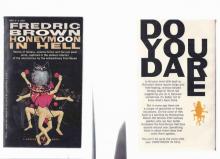 Hall of Mirrors
Hall of Mirrors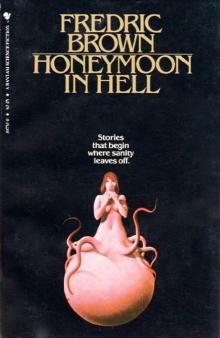 Honeymoon in Hell
Honeymoon in Hell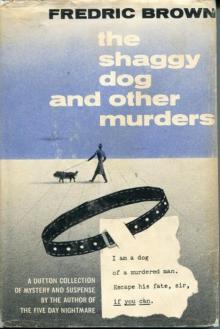 The Shaggy Dog and Other Murders
The Shaggy Dog and Other Murders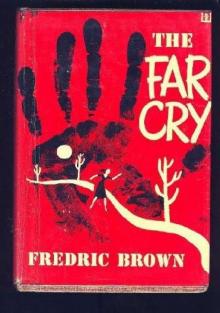 The Far Cry
The Far Cry Arena
Arena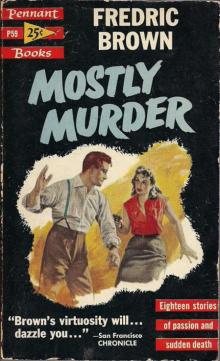 Mostly Murder
Mostly Murder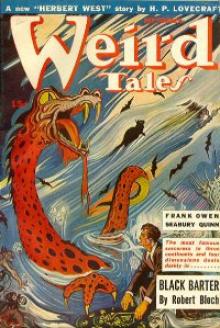 The Geezenstacks
The Geezenstacks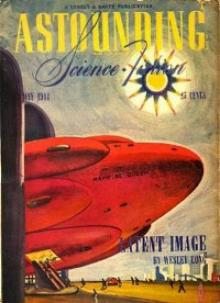 The Yehudi Principle
The Yehudi Principle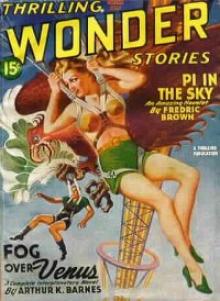 Pi in the Sky
Pi in the Sky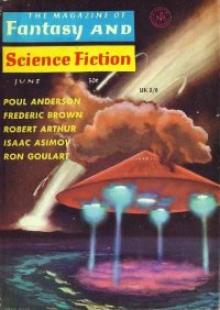 Eine Kleine Nachtmusik
Eine Kleine Nachtmusik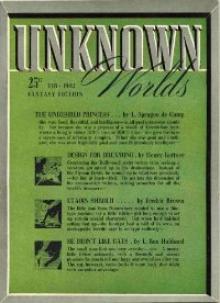 Etaoin Shrdlu
Etaoin Shrdlu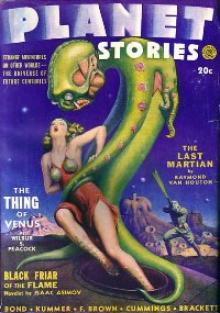 The Star Mouse
The Star Mouse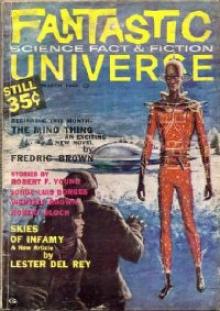 The Mind Thing
The Mind Thing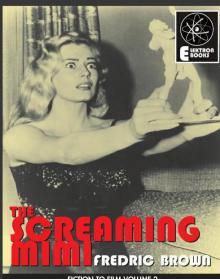 The Screaming Mimi
The Screaming Mimi The Fabulous Clipjoint
The Fabulous Clipjoint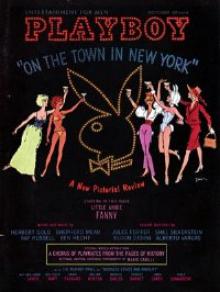 Puppet Show
Puppet Show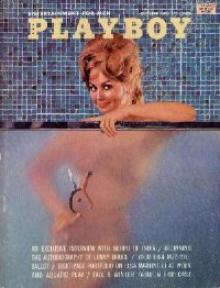 It Didn't Happen
It Didn't Happen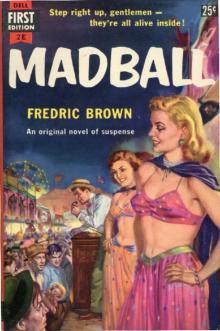 Madball
Madball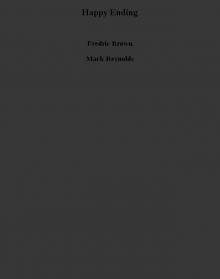 Happy Ending
Happy Ending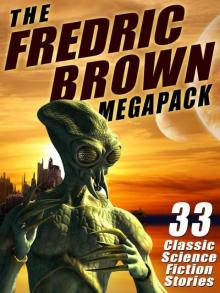 The Fredric Brown Megapack: 33 Classic Science Fiction Stories
The Fredric Brown Megapack: 33 Classic Science Fiction Stories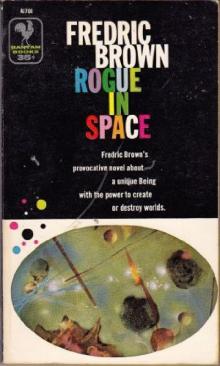 Rogue in Space
Rogue in Space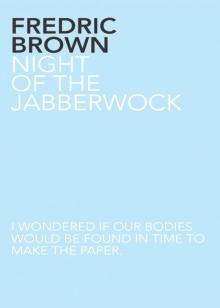 Night of the Jabberwock
Night of the Jabberwock The Dead Ringer
The Dead Ringer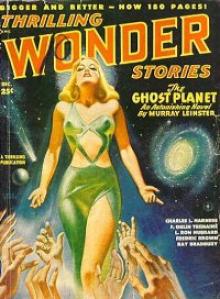 Knock
Knock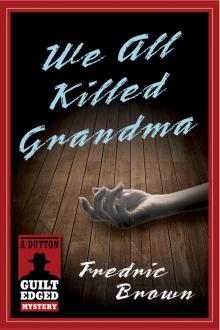 We All Killed Grandma
We All Killed Grandma Space On My Hands
Space On My Hands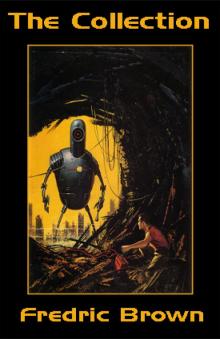 The Collection
The Collection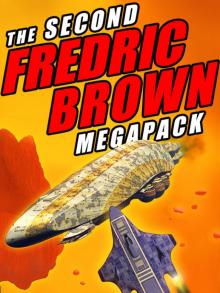 The Second Fredric Brown Megapack: 27 Classic Science Fiction Stories
The Second Fredric Brown Megapack: 27 Classic Science Fiction Stories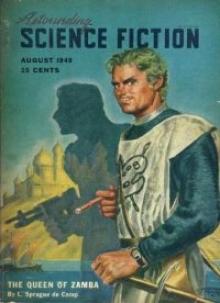 Letter to a Phoenix
Letter to a Phoenix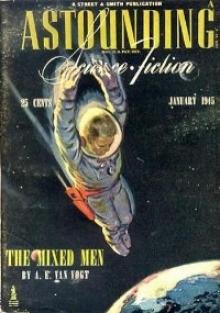 The Waveries
The Waveries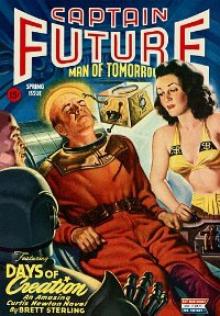 Nothing Sirius
Nothing Sirius The Deep End
The Deep End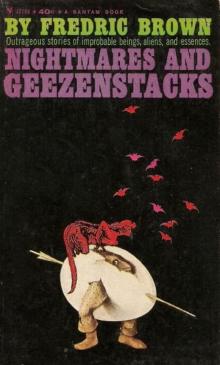 Nightmares & Geezenstacks
Nightmares & Geezenstacks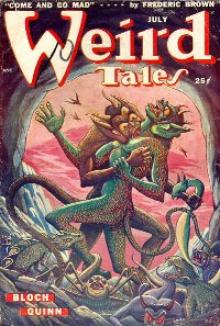 Come and Go Mad
Come and Go Mad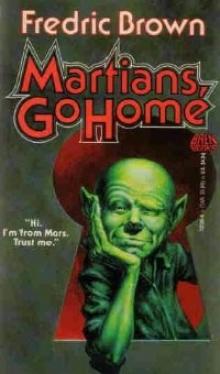 Martians, Go Home
Martians, Go Home